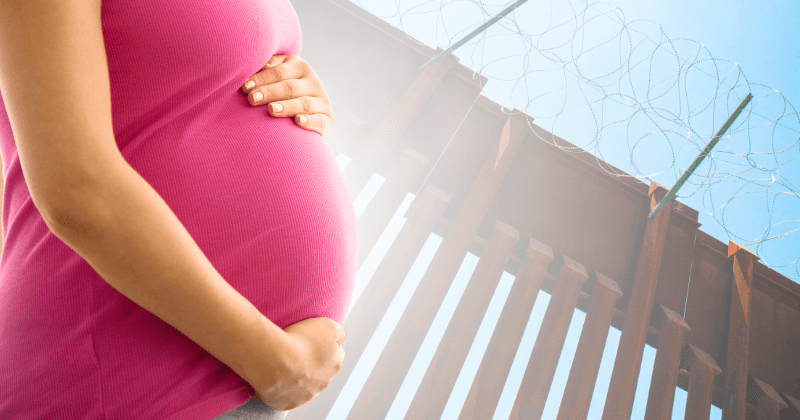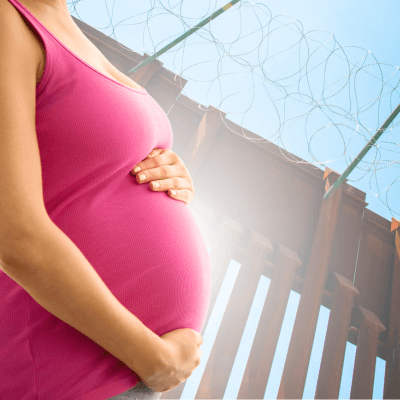The Health Consequences of Overwhelm at the US-Mexico Border

Last year, Veronica* left Venezuela with her husband, walking thousands of miles – including through the notoriously dangerous Darien Gap – to reach the US-Mexico border. She left behind her three children.
She arrived at the border this May, days before Title 42 ended. She was seven months pregnant. US Customs and Border Protection separated her from her husband for processing. Because of her pregnancy, she was permitted to ask for asylum. Her husband was likely sent back to the Mexican side of the border.
After she was processed, Veronica was released to a Texas immigration shelter. Migrant Clinicians Network, a nonprofit focused on migrant health, has staff who work on the border to register newly released asylum seekers with ongoing health conditions into Health Network, MCN’s virtual case management program. Health Network Associates then help them find appointments at health centers and connect them with services and programs in their receiving communities. Without case management, few asylum seekers would be able to navigate and afford these health systems, with some ending up in labor in the emergency room after no prenatal care – not just a more expensive option, but less effective in ensuring the health of the mother and baby.
Enedelia Basurto, Health Network Associate, met Veronica at the shelter, but she doesn’t know much of her story, including her reasons for leaving Venezuela. When Health Network Associates work with traumatized patients, they do not ask for migrants to tell their traumas as part of their intake paperwork; we are open to listen, but it’s not required. Veronica was one of several pregnant asylum seekers that Basurto enrolled that day into Health Network. She didn’t share much.
“Before Title 42 ended, we enrolled dozens of patients a day, and we received more as May 11th approached,” said Basurto. In the enrollment, Veronica told Basurto that she would stay with her uncle in Chicago. Veronica left the border shortly after.
When Veronica arrived in Chicago, however, her uncle rejected her. Veronica was left with nowhere to go and entered the shelter system. Chicago, like many cities, has recently experienced an influx of asylum seekers, and is struggling to provide sufficient shelter resources. Less than a week after Health Network enrolled Veronica, Health Network received a call from the Chicago police. The local police department had been designated as an emergency shelter. Basurto spoke with a Sergeant who confirmed that Veronica was safe and had shelter; she had been sleeping on a mat on the floor.
“Severe stress can cause serious health consequences on the pregnancy,” noted Laszlo Madaras, MD, MPH, Chief Medical Officer for MCN, who oversees Health Network cases. “The stress of not having a secure home or shelter, no family support, no dependable source of food or medical care while pregnant can put significant strain on a pregnancy. Many women have fled violence and trauma in their homeland to seek a safer life for their newborn, only to be retraumatized on arrival.”
“I informed the sergeant about [Veronica’s prenatal] appointment that I had scheduled for her at the nearest clinic, and offered to arrange transportation,” Basurto said. Basurto took steps to help Veronica establish care with a health center, so her birth can be planned, and not require an emergency room visit.
“Veronica’s experience highlights what asylum seekers contend with,” Dr. Madaras noted. “Health Network Associates do everything they can to remove barriers to care, but so many people don’t have any support to connect to services.”
Nonprofits and community-based organizations have been essential in triaging incoming asylum seekers to confirm they’re healthy enough to travel to their next destination, and connecting them with services in their new communities. Many of these programs, however, are overwhelmed and underfunded. As asylum seekers are released into the US, Chicago and other major cities are right to prioritize finding them basic shelter. But those who are permitted into the country with urgent health issues also need to have access to linguistically appropriate, trauma-informed health care. Asylum seekers need support navigating the health system, and the government needs to provide funds for that navigation and resulting care. It is inhumane to leave desperate people with urgent health needs, like a pregnant person, to figure it out themselves, in a new country, with little to no funds, no job, and no access to a safety net. If we permit them into the country to await their immigration hearing, we as a nation must commit to providing this basic care.
*Veronica’s name has been changed to protect her identity.
- Log in to post comments
